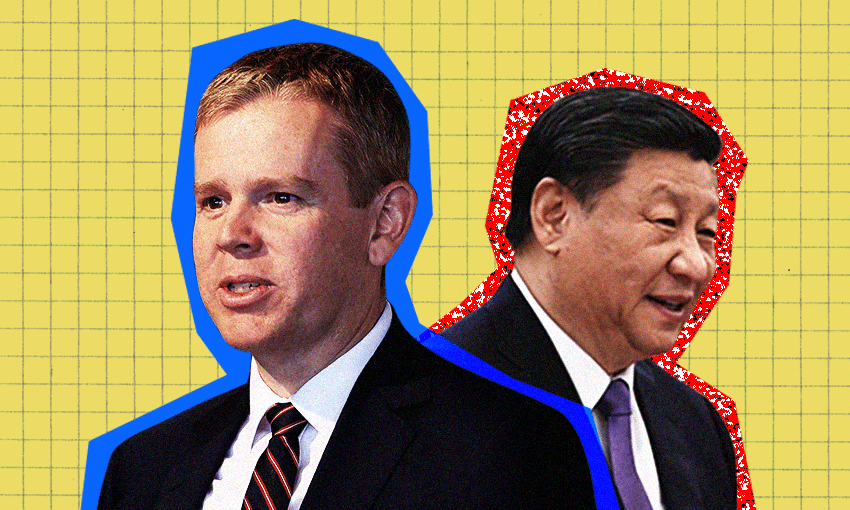In the most substantial New Zealand political and business delegation for at least eight years, the PM faces a delicate task, says the author of a new book on NZ-China relations.
Chris Hipkins will not expect to return from China with any new big-ticket deals, but success will be measured in the messages of restored trade ties – and avoiding any diplomatic tripwires. In that light, the week-long visit “is a big deal”, according to Sam Sachdeva, author of the newly published The China Tightrope: Navigating New Zealand’s relationship with a world superpower.
“There’s not a lot of tangible wins that I think Hipkins can expect to take away,” said Sachdeva in a special edition of the Spinoff politics podcast Gone By Lunchtime. “We signed a [free trade agreement] upgrade not that long ago. Trade is the heavy emphasis mainly because talking about anything else gets very touchy. So it’s going to be more about the symbolism of taking businesses over there and saying, ‘look, we’re here, we’re happy to do trade with you, your tourists [are welcome], send your international students. But it’s more sort of vibes and photo ops, I think, than any sort of, look, we’ve signed this new, shiny agreement.”
The domestic and international outlook of China was different when it signed that FTA with New Zealand – a first for Beijing – in 2008. “So much has changed over the last few years,” said Sachdeva. “We’ve got a much more muscular assertive foreign policy approach from Xi Jinping … and there’s been then there’s this ‘wolf warrior diplomacy’.” Concerns have heightened over Beijing emphasising its claim on Taiwan is a priority, while the Pacific has become the focus of competing interests between the west and China.
After a long political career focused principally on domestic portfolios, Hipkins faces his biggest test in the international sphere over the week ahead. The trip begins in Beijing, where he is expected to meet with President Xi and Premier Li Qiang in the Great Hall of the People. Hipkins has said “topics such as climate change, economic stability, regional and global security, human rights, and the war in Ukraine will be discussed”. He’ll travel to Tianjin for the opening of the World Economic Forum’s “Annual Meeting of New Champions” and then to Shanghai for trade and tourism focused meetings.
With tensions simmering around the emergence of geopolitical and military alliances, China would likely express its disquiet at New Zealand looking to join, albeit on an affiliate or “pillar two” basis, the Aukus grouping of Australia, the US and the UK, said Sachdeva. “Having said that, if you look at Australia, which is one of the founding members of Aukus – it’s getting these nuclear powered submarines – actually, their relationship with China is improving. It’s not perfect, but it shows that being in the mix with these things does not necessarily spell doom or death to the idea of a strong trade relationship or relationship in other areas … You can disagree, in quite fundamental ways, without necessarily supervising the whole thing.”
Beyond the door-openings, photo-ops and the potential for a few incremental signed agreements, the challenge for Hipkins was “not being sucked into saying anything that could be … pushed by the Chinese state media and other outlets to promote the Chinese line on things like Aukus, like 5 Eyes”, said Sachdeva.
Publications such as the Global Times and the People’s Daily had over recent years taken the opportunity “to drive a wedge between New Zealand and Australia”. A number of stories over recent years, when Australia was seen as being antagonistic, commentaries had appeared on the sites suggesting, “why can’t Australia be more like New Zealand and be more respectful of China and be more positive?” said Sachdeva. “So I think anything that feeds into that will be something for Hipkins to watch out for.”
That theme was present even before Hipkins left New Zealand. Asked about US President Joe Biden’s characterisation of Xi as a dictator, Hipkins said he disagreed, adding: “If they wanted to change their system of government, then that would be a matter for them.” That response made international headlines.
Biden’s comments came following the completion of a major trip to China by secretary of state Anthony Blinken. Though Blinken had not secured his big goal, of reopening military lines of communication between the US and China, the visit had gone some way to thawing tensions between the two countries, said Sachdeva. “It’s good that you’ve got both sides, at least willing to talk and say, look, we need to keep things stable, even if we’re not going to suddenly become best of friends overnight.”
As to the nature of discussions between Blinken and the Chinese president, Sachdeva painted the nightmare scenario. “Maybe Blinken and Xi were exchanging beverage tips for Chris Hipkins. If you remember, Anthony Blinken ceremonially presented Chippy with a Coke Zero [during a US-Pacific Island summit] in Papua New Guinea, so he could pass that on. Sausage rolls and Coke Zeros in the Great Hall of the People. It would be quite a vibe.”
Follow our politics podcast Gone By Lunchtime on Apple Podcasts, Spotify or your favourite podcast app.





